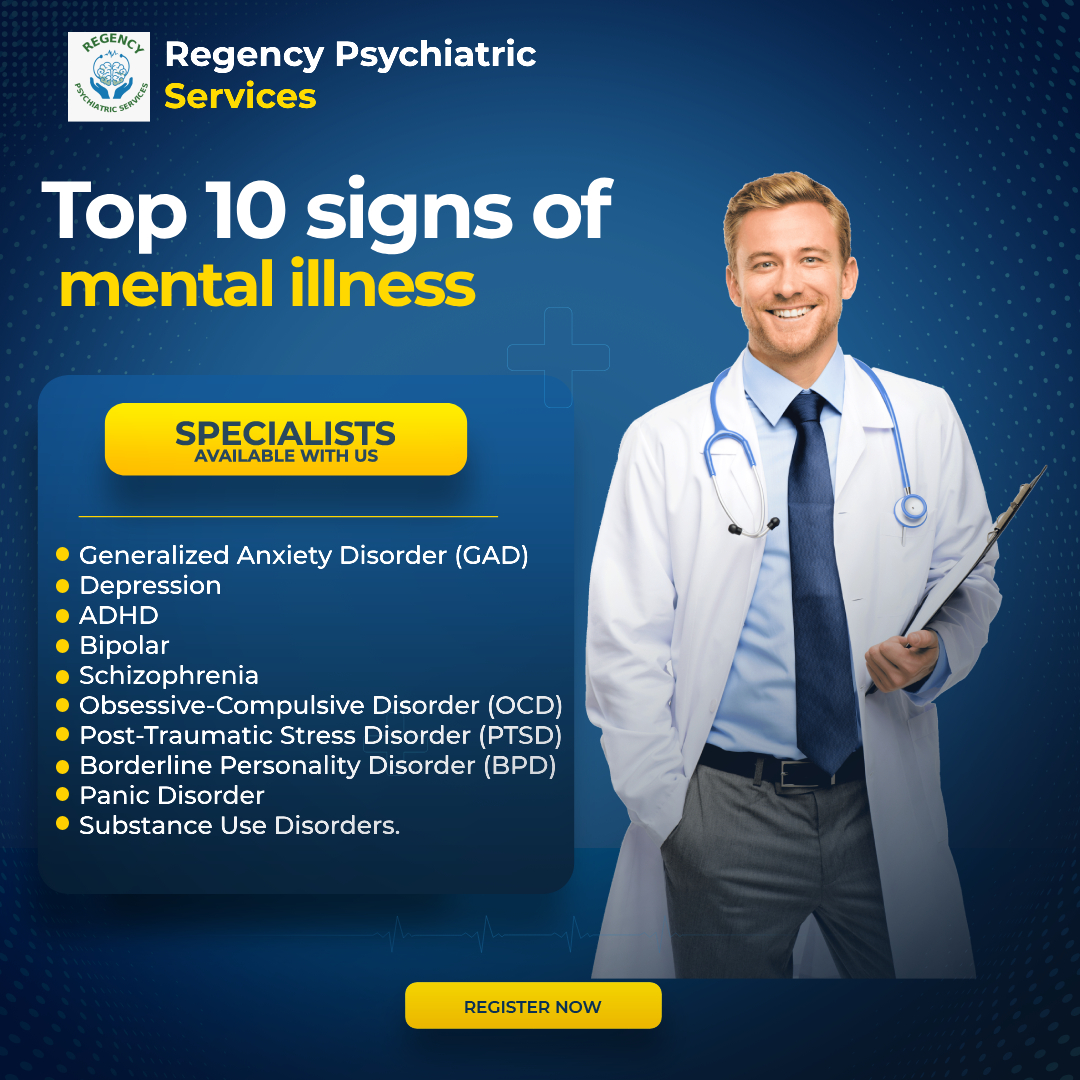Millions of people have been affected by mental Illness, but this remains highly stigmatized and often misunderstood. It is crucial to recognize the signs of mental illness to support individuals who may be struggling and encourage them to seek professional help.
What is Mental Illness?
Mental Illness, also known as a mental disorder, refers to a wide range of conditions that affect an individual’s thoughts, emotions, behaviors, and overall functioning. These conditions can manifest in various ways, ranging from mild to severe, and may be temporary or chronic.
Mental illnesses can include: –
- ADHD
- Depression
- PTSD
- Anxiety disorders
- Panic Attacks
- OCD/ODD
- Paranoid
- Sleep disorder/Insomnia
- Bipolar disorder
- Schizophrenia
- Eating disorders; And many others!
Stop! Do you need Mental Health Treatment?
Reaching out for professional help is a must, as mental health is an essential aspect of overall well-being.
Some of the general warning signs are: –
- Feeling Overwhelmed
- Decrease energy.
- Decrease motivation.
- Lack of sleep
- Irritability
- Unable to complete or finish task
- Uncontrolled Anger
- Extreme mood swings
- Practicing Self-Isolation
- In disciplinary Eating or Sleeping Habit
- Extensively concerned about external appearance
- Unexplainable health issues
- Substantial Abuse
- Self-harm or Suicidal Thoughts
Can you experience Mental Illness at this Age?
Are these factors triggering your mental health?
- Biological Factors
- Environmental Factors
- Psychological Factors
- Substance Abuse
- Social and Cultural Factors
Do you know if your mental Illness is a serious one?
Any mental illness is known to be severe if it severely interferes with and restricts your ability to complete daily life tasks or social activities.
Are you suffering from some of these serious mental illnesses?
Mental Illnesses sometimes become very complicated, affecting millions of individuals, thereby getting very difficult to detect.
Some of the seriously affected mental disorders are:-
- ADHD:-
Is a chronic condition that includes attention difficulty, hyperactivity, and impulsiveness.
ADHD often begins in childhood and can persist into adulthood. It may contribute to low self-esteem, troubled relationships, and difficulty at school or work.
Symptoms include limited attention and hyperactivity. Moor symptoms include: being unable to sit still in a meeting or class, Forgetfulness, procrastination, decreased concentration, interrupting conversations, fidgeting, being unable to wait their turn, inner restlessness, and excessive physical movements
Treatments for ADHD include medication, behavioral, and talk therapy.
2.Anxiety Disorders:-
According to American Psychiatric Association, Anxiety is a normal stress reaction. However, it can alert us to dangers and help us prepare and give awareness. Anxiety disorders are the most common mental health disorders.
Generalized anxiety disorder involves persistent and excessive worry that interferes with daily activities. This ongoing worry and tension may be accompanied by physical symptoms, such as restlessness, feeling on edge or easily fatigued, difficulty concentrating, muscle tension, or problems sleeping.
3.Schizophrenia
Schizophrenia has been known as a chronic and severe mental disorder that affects how a person thinks, feels, and behaves. Individuals with schizophrenia may experience hallucinations, delusions, disorganized speech and behavior, and a reduced ability to carry out daily activities.
Treatments include-
Treatment often involves a combination of medication, therapy, and support from mental health professionals.
4.Bipolar Disorder
Bipolar disorder is characterized by extreme mood swings that fluctuate between periods of mania and depression. These mood episodes can vary in intensity and duration, significantly affecting a person’s energy levels, sleep patterns, judgment, and behavior.
Treatments include– Medication and CBT (Cognitive behavioral therapy)
Careful management, including mood stabilizers, medicine, and lifestyle adjustments to promote stability and minimize the impact of mood episodes!
5.Obsessive-Compulsive Disorder (OCD)
OCD is an anxiety disorder characterized by intrusive thoughts (obsessions) and repetitive behaviors or rituals (compulsions) performed to alleviate anxiety.
Treatments include- Medication and CBT
Treatment typically involves therapy, medication, and support groups.
Top 10 types of mental Illness
- Generalized Anxiety Disorder (GAD)
- Depression
- ADHD
- Bipolar
- Schizophrenia
- Obsessive-Compulsive Disorder (OCD)
- Post-Traumatic Stress Disorder (PTSD)
- Borderline Personality Disorder (BPD)
- Panic Disorder
- Substance Use Disorders.
Can we treat mental Illness?
Treating mental Illness requires a multifaceted approach that typically combines various strategies. Some of the proven mental illness treatments are-
1.Psychotherapy (Talk Therapy)
This includes engaging with a trained therapist who provides support and guidance and helps individuals develop coping mechanisms and strategies for managing their symptoms.
2.Mixed Treatments
Providing mixed treatments, including medications, therapy and meditation. This includes antidepressants, antipsychotics, mood stabilizers, and anti-anxiety medications, which can be crucial in managing mental illnesses.
Bottom Line
Mental health concerns are life-threshing and should be addressed on a priority basis. It is essential to look after your loved ones and help them overcome it together!



